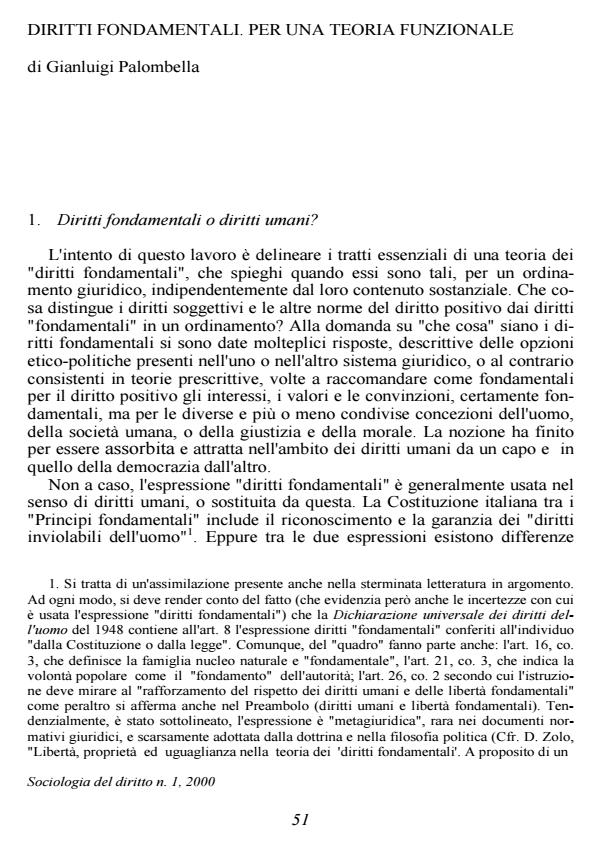Diritti fondamentali. Per una teoria funzionale
Titolo Rivista SOCIOLOGIA DEL DIRITTO
Autori/Curatori Gianluigi Palombella
Anno di pubblicazione 1 Fascicolo 2000/1
Lingua Italiano Numero pagine 38 P. Dimensione file 206 KB
DOI
Il DOI è il codice a barre della proprietà intellettuale: per saperne di più
clicca qui
Qui sotto puoi vedere in anteprima la prima pagina di questo articolo.
Se questo articolo ti interessa, lo puoi acquistare (e scaricare in formato pdf) seguendo le facili indicazioni per acquistare il download credit. Acquista Download Credits per scaricare questo Articolo in formato PDF

FrancoAngeli è membro della Publishers International Linking Association, Inc (PILA), associazione indipendente e non profit per facilitare (attraverso i servizi tecnologici implementati da CrossRef.org) l’accesso degli studiosi ai contenuti digitali nelle pubblicazioni professionali e scientifiche.
What makes some rights "fundamental"? The author explains the "fundamental" character of rights on the basis of a functional theory that takes account of the role played by the rules providing rights in legal systems. Only rights which 'as rules' become rules of recognition, or criteria used within the rule of recognition of a given system, can reasonably be defined fundamental: any other axiological or substantive definition of fundamental rights misses the point, prescribing a normative (and extra-legal) view of rights. This is useless to a legal theory and does not explain the reason why what political or moral theory tries to universalize as "fundamental rights" often gets unimplemented or partially recognized in the legal system. In order to develop his theory, the author: i) maintains a content-based definition of rights, which acknowledges the right as centered on the systemic relevance of a common value (interest) related to the advantage of a subjective position; ii) shows how his functional theory of fundamental rights enables to accept property rights as fundamental ones (if it is the case) and above all to defeat the claim of universality of rights as a necessary condition of their being "fundamental"; iii) explains the uselessness of the distinction between liberal and social rights, at least when meant to represent hypothetical different State duties or a different status compared to property rights. Finally, the author tackles and criticizes the well-known conviction that fundamental rights serve something like a "substantive democracy", instead of simply exposing the notion of Rule of law.
Gianluigi Palombella, Diritti fondamentali. Per una teoria funzionale in "SOCIOLOGIA DEL DIRITTO " 1/2000, pp , DOI: